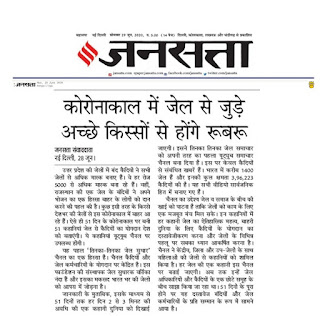तिनका जेल न्यूज ने कोरोना जेल समाचारों का रिकॉर्ड बनाया
COVID-19 के दौरान जेलों की पहल के लिए समर्पित एक विशेष YouTube चैनल- पिछले 51 दिनों में 51 कहानियां जेलों का एक नया चेहरा सामने लाती रहीं
- यह खंड 2018 में शुरू किए गए तिनका तिनका जेल सुधार चैनल का एक हिस्सा है
- चैनल बाहरी दुनिया की मदद करने के लिए कैदियों और जेल कर्मचारियों के योगदान पर केंद्रित है और एक नई तरह की पत्रकारिता की अलख जगा रहा है
- जेल सुधारक वर्तिका नन्दा तिनका तिनका फाउंडेशन की संस्थापक हैं, जिसका मकसद भारत भर की जेलों को जोड़ना है।
तिनका तिनका जेल समाचार के बारे में
51 दिनों तक हर दिन एक से तीन मिनट की अवधि की कहानी कोरोना के दौरान जेलों और उनके योगदान की दुनिया को सामने लाती रही। इसने तिनका तिनका जेल समाचार को अपनी तरह का पहला YouTube समाचार चैनल (tinkatinkaprisonreforms) बना दिया है जिसने भारत भर की जेलों से समाचार पहुंचाने के लिए खुद को समर्पित किया है। भारत में करीब 1400 जेलें हैं, जिनकी कुल क्षमता 3,96,223 कैदियों की है। तिनका तिनका जेल समाचार एक समय में एक जेल या एक मकसद पर तथ्यात्मक कहानी सुनाता है। इस पहल की शुरुआत मार्च में लॉक़डाउन की शुरुआत के साथ की गई थी। मई से इसे एक नियमित अभ्यास बना दिया गया। यह सभी वीडियो सार्वजनिक हित में बनाए गए हैं।
तिनका तिनका जेल न्यूज़ जेल सुधारक वर्तिका नन्दा की संकल्पना है। इसका उद्देश्य COVID-19 की वजह से लगाए गए लॉकडाउन के समय जेलों और समाज के बीच की खाई को पाटना है और जेलों के काम को एक मजबूत मंच मुहैया करवाना है। इस पहल की भावना तीन भागों में है- हर स्टोरी में जेल विशेष के ऐतिहासिक महत्व को प्रकट करना, बाहरी दुनिया के लिए कैदियों द्वारा किए गए योगदान का दस्तावेजीकरण करना और जेलों का एक पहलू प्रस्तुत करना जोजिस पर किसी का ध्यान नहीं जाता। एक समय में एक कहानी सुनाकर, इस चैनल ने भारत में जेलों के कम ज्ञात चेहरे को बाहर लाने के लिए खुद को समर्पित किया, खासकर COVID-19 के दौरान। दिलचस्प बात यह है कि चैनल ने सभी महत्वपूर्ण प्रकार की जेलों-केंद्रीय, जिला जेलों , उप-जेलों और महिलाओं की जेलों से कहानियों को उठाया है। चैनल दुनिया में मदद करने के लिए मास्क, सैनिटाइज़र, पीपीई किट और अन्य साधनों के छोटे पैमाने पर प्रयासों में लगे कैदियों के वास्तविक योगदान को जोड़ने में सक्षम रहा है। इन कहानियों में संबंधित अधीक्षक और अन्य वरिष्ठ कर्मियों के नाम उल्लिखित हैं।
चैनल ने इस योगदान के एक विशाल रेंज दिखाया है। जिला जेल, मेरठ, उत्तर प्रदेश में बंद कैदियों ने उत्तर प्रदेश की सभी जेलों में अधिकतम मास्क बनाए हैं। वे हर रोज 5000 से अधिक मास्क की सिलाई करते हैं। राजस्थान की एक जेल के बंदियों ने अपने भोजन का एक हिस्सा बाहर के लोगों को दान करने की पहल की। मध्य प्रदेश की केंद्रीय जेल, जबलपुर में 40 पुरुष और 13 महिला बंदी हर दिन 1500 मास्क बनाने में शामिल हैं। मध्यप्रदेश में लगभग 52 जेलों में यही किया जा रहा है। मॉडल जेल, चंडीगढ़ के बंदियों ने अपनी गाढ़ी कमाई में से 1,11,000/ रूपए कोरोना के संकट से बचाव के लिए मुख्यमंत्री राहत कोष को दान में दिए। तिनका तिनका के प्रयासों से पिछले 51 दिनों में जेलों के बदलाव और काम की सच्ची कहानियाँ दृढ़ता से उभरी हैं। इस श्रृंखला में बंदियों के काम के अलावा रविवार को योग दिवस और विश्व संगीत दिवस जैसे कुछ विशेष दिन और तिनका और बंदियों के कुछ साझे प्रयास भी सरोकार के तौर पर शामिल किए गए। इऩ्हें जेल अधिकारियों और कैदियों के एक छोटे समूह के बीच चुपचाप साझा किया जा रहा था और उन्हें सार्वजनिक चकाचौंध से दूर रखा गया था। 51 दिनों के पूरा होने पर यह दस्तावेज बंदियों और जेल कर्मचारियों के प्रति सम्मान के रूप में सामने आया है। इन समाचारों का संपादन रिया वर्मा ने किया है और मोंटाज को नितिन चौधऱी ने बनाया है। अब यह चैनल जेलों पर साप्ताहिक प्रस्तुतिकरण करेगा।
वर्तिका नन्दा के बारे में: वर्तिका नन्दा जेल सुधारक हैं और तिनका तिनका भारतीय जेलों पर उनकी श्रृंखला है। वे 2014 में भारत के राष्ट्रपति से स्त्री शक्ति पुरस्कार से सम्मानित हो चुकी हैं। जेलों पर उनके काम को दो बार लिम्का बुक ऑफ रिकॉर्ड्स में भी जगह मिली है। वर्तमान में वे दिल्ली विश्वविद्यालय के लेडी श्रीराम कॉलेज के पत्रकारिता विभाग की प्रमुख हैं। संपर्क : tinkatinkaorg@gmail.com / 9811201839








